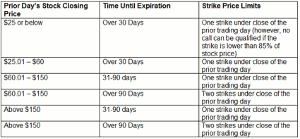The federal tax rules concerning options are among the most complex sections of the tax code, and this complexity has led to many misunderstandings, writes Michael Thomsett of ThomsettOptions.com.
For example, many traders have heard that some covered calls are “unqualified.” What does this mean? It means that in some situations, a trader who has opened such a position will not be able to claim long-term gains if and when the call is exercised and the underlying called away. This applies only if you have held the underlying for less than one year. When you open an unqualified covered call, the count to that one-year holding period is tolled. So it is possible that your stock could be called away after a one-year holding period, but treated as short-term.
For example, you have owned 100 shares of stock for nine months and you have a seven-point paper profit. You sell an unqualified covered call and get a big premium, with a strike equal to your original basis seven points lower than current value. Four months later, that call is exercised. Your stock is called away. Although you held the stock for 13 months, the assigned stock is treated as short-term; the count toward the one-year long-term holding period stopped at nine months when you sold the unqualified covered call.
Some traders believe that when a call is defined as “unqualified,” that means they are not allowed to open the position. This is not true.
In general, a deep ITM call is going to be qualified; but not always. The definition of what constitutes an unqualified covered call relies on two factors: the underlying’s prior day closing price; and the time remaining until expiration. The following table shows how different underlying prices and time to expiration define “unqualified” covered calls:
Although this restriction requires careful tax planning to avoid an unpleasant surprise, there is also a strategic consideration to this problem. If you have an exceptionally large carryover loss—as many traders do—you will not be affected by this rule. Because you are restricted to a maximum deduction of $3,000 per year, an unqualified covered call may create short-term profits, but the large carryover loss shelters those profits from tax. This enables you to use up the carryover more rapidly.
This oddity in the tax law originally was intended to prevent options traders from timing multi-leg strategies to defer taxes to the following year. Traders could sell deep ITM calls in December, for example, to effectively take profits on stock above original basis. In this case, the premium on the covered call would not be taxed until the following year when it was closed, rolled, or exercised. This is desirable compared to the alternative of selling stock and paying taxes on the profit. However, the rules have made options tax planning very complex. Traders need to check with their tax advisor to ensure that they understand these rules.
By Michael Thomsett of ThomsettOptions.com











